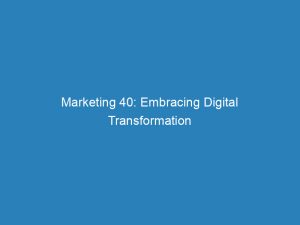- marketing 4.0
- 1. Introduction To Marketing 4.0
- 2. Philip Kotler: The Inventor Of Marketing 4.0
- 3. Evolution Of Marketing: Phases 1.0, 2.0, And 3.0
- 4. Key Focus Of Marketing 4.0: Personalization, Technology, And Innovation
- 5. Strategies For Implementing Marketing 4.0
- 6. Importance Of Listening To Customer Feedback
- 7. Maximizing Integration: Online And Offline Strategies
- 8. Thriving In The Digital Environment: Adopting Marketing 4.0
In this fast-paced digital age, the world of marketing is constantly evolving, leaving no room for businesses to lag behind. Enter Marketing 4.0, the powerful fusion of traditional and digital marketingstrategies that revolutionizes the way we connect with our audience.
At its core, Marketing 4.0 is all about personalization, innovation, and embracing technology to create unforgettable customer experiences. Spearheaded by the brilliant mind of marketing guru Philip Kotler, this groundbreaking approach enables businesses to thrive in today’s hyper-connected world.
Join us on a journey into the exciting realm of Marketing 4.0, where endless possibilities await those bold enough to embrace them.
| Item | Details |
|---|---|
| Topic | Marketing 40: Embracing Digital Transformation for Business Success |
| Category | Ads |
| Key takeaway | In this fast-paced digital age, the world of marketing is constantly evolving, leaving no room for businesses to lag behind. Enter Marketing 4. |
| Last updated | December 27, 2025 |
marketing 4.0
Marketing 4.0 is a marketing approach that combines the traditional methods with digital marketing in the digital age. It is a concept developed by Philip Kotler, often referred to as the “inventor” of Marketing 4.0.
This approach recognizes the evolution of marketing through phases 1.0, 2.0, and 3.0. Marketing 4.0 focuses on personalization, utilizing technology, and constant innovation to drive success.
Strategies for Marketing 4.0 include actively listening to customer feedback, integrating online and offline strategies, investing in omnichannel marketing, monitoring results, and creating relevant content. Adopting Marketing 4.0 is essential for businesses to thrive in the digital environment where technology and customer expectations are constantly evolving.Key Points:
- Marketing 4.0 combines traditional and digital marketing methods in the digital age
- Concept developed by Philip Kotler, known as the “inventor” of Marketing 4.0
- Recognizes evolution of marketing through phases 1.0, 2.0, and 3.0
- Focuses on personalization, technology, and innovation for success
- Strategies include:
- Listening to customer feedback
- Integrating online and offline strategies
- Investing in omnichannel marketing
- Monitoring results
- Creating relevant content
- Adoption of Marketing 4.0 is essential for thriving in the evolving digital environment.
Sources
https://hotmart.com/en/blog/marketing-4-0
https://books.google.com/books/about/Marketing_4_0.html?id=jN9mDQAAQBAJ
https://www.marketingjournal.org/marketing-4-0-when-online-meets-offline-style-meets-substance-and-machine-to-machine-meets-human-to-human-philip-kotler-hermawan-kartajaya-iwan-setiawan/
https://www.edcparis.edu/en/blog/marketing-4-0-definition-and-features
Check this out:
💡 Pro Tips:
1. Embrace customer-centricity: In Marketing 4.0, it is crucial to prioritize the needs and desires of your customers. By understanding their preferences and creating personalized experiences, you can build stronger relationships, foster brand loyalty, and gain a competitive edge.
2. Leverage social media influencers: With the rise of social media, influencers have become powerful voices that can greatly impact consumer decisions. Collaborating with influencers who align with your brand can help you reach a wider audience and create authentic connections with potential customers.
3. Utilize data analytics: Take advantage of the vast amount of data available in the digital age to gain insights into customer behavior and preferences. By analyzing this data, you can make more informed marketing decisions and tailor your strategies to create more effective and targeted campaigns.
4. Invest in artificial intelligence: As technology continues to advance, incorporating artificial intelligence (AI) into your marketing efforts can significantly enhance your capabilities. AI-powered tools can automate tasks, provide personalized recommendations, and extract valuable insights from data, helping you streamline your marketing processes and improve overall efficiency.
5. Foster a culture of innovation: In Marketing 4.0, staying ahead of the curve requires constantly embracing innovation. Encourage a culture of creativity and experimentation within your organization, allowing employees to explore new ideas and approaches. This mindset will enable you to adapt quickly to changing market trends and seize opportunities for growth.
1. Introduction To Marketing 4.0
Marketing 4.0 represents the convergence of traditional marketing principles with digital marketing strategies in the digital age. As technology continues to advance and consumer behavior evolves, businesses must adapt their marketing approaches to stay relevant and competitive.
This article will delve into the concept of Marketing 4.0, its key components, and strategies for its successful implementation.
2. Philip Kotler: The Inventor Of Marketing 4.0
Philip Kotler, widely regarded as the “inventor” of Marketing 4.0, has made significant contributions to the field of marketing. He has authored numerous books on the subject, including “Marketing 4.0: Moving from Traditional to Digital,” where he introduces the concept.
Kotler recognized the need for marketers to embrace digital channels and technologies to connect with today’s digitally savvy consumers.
3. Evolution Of Marketing: Phases 1.0, 2.0, And 3.0
To understand Marketing 4.0, it is essential to explore its predecessors. Marketing 1.0 was focused on product-centricity, with little consideration for customer preferences.
It primarily revolved around mass production and mass marketing. Marketing 2.0 emerged with a customer-centric approach, emphasizing customer satisfaction and relationship-building.
Marketing 3.0 further evolved to incorporate societal considerations, highlighting the importance of values and beliefs in consumer decision-making. However, none of these phases fully embraced the power of digital technologies, which Marketing 4.0 seeks to leverage.
New insights from FroggyAds platform analytics.
4. Key Focus Of Marketing 4.0: Personalization, Technology, And Innovation
Marketing 4.0 places a strong emphasis on personalization, utilizing technology, and fostering innovation. These three pillars enable businesses to better connect with their target audience and create more meaningful customer experiences.
Personalization involves tailoring marketing messages and offerings to individual customers based on their preferences, behaviors, and demographics. Technology plays a crucial role in Marketing 4.0, allowing marketers to leverage data analytics, artificial intelligence, and automation to deliver personalized experiences at scale.
Finally, innovation ensures that businesses remain dynamic and adaptive in the ever-changing digital landscape.
5. Strategies For Implementing Marketing 4.0
To successfully implement Marketing 4.0, businesses must adopt a holistic approach and consider several key strategies:
Listen to customer feedback: Actively seeking and incorporating customer feedback allows businesses to better understand customer needs and adjust their marketing strategies accordingly. – Integrate online and offline strategies: Seamless integration of online and offline channels ensures a consistent and cohesive brand experience across all touchpoints.
Invest in omnichannel marketing: Engage customers through multiple channels, such as websites, social media platforms, mobile apps, and physical stores, to provide a seamless and personalized customer journey. – Monitor results: Regularly track and analyze marketing metrics to measure the effectiveness of campaigns, make data-driven decisions, and optimize marketing efforts.
Create relevant content: Develop and distribute valuable, informative, and engaging content that aligns with customer interests and preferences.
6. Importance Of Listening To Customer Feedback
Listening to customer feedback is a critical aspect of Marketing 4.0. By actively engaging with customers and understanding their needs, businesses can adapt their products, services, and marketing strategies to better serve their target audience.
Real-time feedback through social media, surveys, and online reviews provides valuable insights into customer preferences, allowing businesses to make data-driven decisions.
7. Maximizing Integration: Online And Offline Strategies
In the era of Marketing 4.0, businesses must seamlessly integrate their online and offline marketing strategies. Rather than treating these channels as separate entities, they should create continuity and consistency in their messaging and branding across both platforms.
This integration ensures that customers have a unified experience, regardless of the channel they engage with.
For example, an online advertisement should align with the messaging on a physical store’s signage or packaging. By combining online and offline efforts, businesses maximize their reach, engage customers at various touchpoints, and provide a cohesive brand experience.
8. Thriving In The Digital Environment: Adopting Marketing 4.0
In today’s digital environment, adopting Marketing 4.0 is crucial for businesses to thrive. The era of traditional marketing approaches is fading as digital technologies continue to reshape consumer behavior.
By embracing Marketing 4.0, businesses can leverage personalization, technology, and innovation to build stronger customer relationships, gain a competitive edge, and achieve long-term success.
In conclusion, Marketing 4.0 marks the integration of traditional and digital marketing strategies. Philip Kotler’s visionary leadership and insights have paved the way for businesses to embrace this new era.
By focusing on personalization, technology, and constant innovation and implementing strategies such as listening to customer feedback, integrating online and offline strategies, and creating relevant content, companies can navigate the digital landscape and flourish in the face of evolving consumer expectations. Embracing Marketing 4.0 is not only essential for survival but also offers unprecedented opportunities for businesses to thrive in the digital age.
Programmatic Advertising • Buy Traffic • Advertising Platform for Marketers











